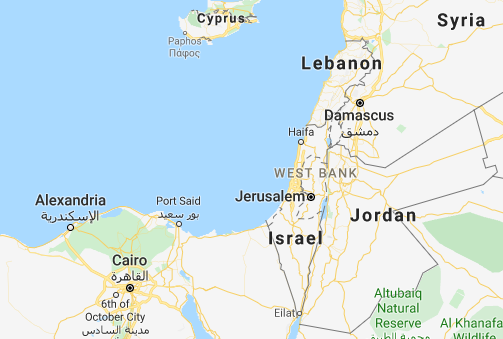Stretched over all of about 20-21 thousand square kilometers, Israel has achieved spectacular progress in several fields like science, technology, agriculture, water management, etc. However, these are not the only reasons for which Israel is known internationally.
Today, a mighty superpower like the United States feels the need to maintain and honour its friendship with a relatively much smaller nation like Israel. One of the primary reasons behind this is the geographic location of Israel. Israel, a state in the Middle East, is situated on the eastern coast of the Mediterranean Sea. The Red Sea is to the south, the nation of Lebanon to the north and Syria to the northeast. To the east is Jordan while Egypt lies to the west. Thus, Israel, the country that joins the continents of Asia and Africa, and which is separated from Europe only by the Mediterranean Sea to the north, geographically holds a very high strategic importance as most of the trade of the European countries with Asia takes place through the Middle East. As a result, conflict in the region is the last thing that the international community wants.

Going by the facts, most of the nations in the Middle East are Arab-Islamic. To balance them, many countries of the world find it imperative to maintain good ties with Israel, a country which is not much at friendly terms with many of the Middle Eastern nations and has taken them head-on successfully.
All of the neighbouring countries of Israel are Arab, and most are at loggerheads with it for some or the other reason. In the course of time, though Egypt and Jordan have had peace treaties with Israel, the ties cannot be termed friendly. With Palestine, Israel has disputes over the territories of the ‘West Bank’, which lies to its east and ‘Gaza’ that is located to the west. The city of Jerusalem, which is regarded holy by all the three Abrahamic religions of Judaism, Christianity and Islam, is in the disputed West Bank. Apart from these, Israel differs with Syria about the control of the Golan Heights which lie to the northeast.

The city of Tel Aviv is regarded as the financial capital of Israel. Moreover, it has also become a centre of research in science and technology. However, Jerusalem is the proclaimed capital and even the seat of government. However, the proclamation is internationally disputed, and many nations are yet to recognize it. Many countries have their embassies in Tel Aviv and not Jerusalem. However, having realized the geopolitical importance of Israel, the current US President Donald Trump has adopted a policy of friendship and cooperation with the Jewish nation. In 2018, President Trump moved the US Embassy from Tel Aviv to Jerusalem. It led to a major furore internationally. Such a step, considered highly symbolic, signifying approval to Jerusalem as the capital of Israel. Hence, many nations which depend on the Arab countries for their energy needs still refrain from taking such a step.
In this background, let us see how Israel fairs on the front of foreign relations.
In 1948, within 11 minutes from the declaration of independence, the United States was the first country to give de factor recognition to Israel. Right since then, relations between Israel and the United States have only continually bettered, especially with respect to military, economy, education, science, technology and diplomacy. For the last many decades, the Jews who have succeeded exceedingly in various fields have used their ‘influence’ to keep the relationship healthy. In February 1949, the United States further gave ‘de jure’ approval to Israel. Three months later, in May 1949, the United Nations bestowed Israel with full membership.

Countries like Turkey, Iran, Guatemala, Iceland were next to the United States in recognizing Israel. In fact, Turkey was the first Islamic nation to recognize Israel and their relations continued to develop for many years. However, in recent times, with the growing Turkish support to Palestine, ties with Israel have considerably deteriorated. Likewise, until the Pahlavi dynasty ruled Iran, they maintained excellent cooperation with Israel. However, after the ouster of the Pahlavis during the Iranian Revolution of 1979, Iran cut off all the diplomatic relations with Israel.
The Soviet Union was the first country to officially recognize (‘de jure’) Israel as a nation. In the post-Soviet era, Russia also has had cordial relations with Israel. Israel maintains friendly relations with China and their cooperation in various sectors is only increasing.
The issue of anti-Semitism that plagued the relationship between Israel and the European states has now taken backstage. Furthermore, with the passing of time, both the sides are working on reconstructing their ties. Israel has based its relations with the Western countries, mainly on the cooperation in research and development in the fields of science and technology. Likewise, with many African nations, Israel has based its relations primarily on providing assistance in agricultural research.
Besides, across the globe, it is generally observed that the conservative political parties are willing to have better relations with Israel contrary to the liberals.
Another reason for nations coming forward increasingly to establish relations with Israel is, it does not take to the offensive against any country. Israeli aggression against its enemies is only retaliatory in nature.
Although most nations have established cooperation with Israel, Arab-Islamic nations are an exception. Except a few, most Arab-Islamic governments consider Israel, their enemy. Moreover, they do not even recognize Israel as a country. Apart from the Arab states of the Middle East, Asian nations like Pakistan, Bangladesh, Indonesia and many other Muslim-majority nations do not recognize Israel. On the other hand, Saudi Arabia, United Arab Emirates and Oman do not maintain relations officially with Israel, but their mutual cooperation is increasing in various sectors.
The Arab-Israeli conflict continued even after the 1973 Yom Kippur War. For the last many years, Israel had had to engage at various conflicts viz., the 1978 South Lebanon conflict, the 1982 Lebanon War, the 1985–2000 South Lebanon conflict, organized uprising by the Palestinian Arabs against Israel in the Gaza Strip and the West Bank (the 1987-1993 First Intifada, the 2000-2005 Second Intifada), the 2006 Lebanon War, the action initiated by Israel since 2008 against armed guerillas of ‘Hamas’, etc.
One of the key players in the Arab-Israeli conflict is the armed Arab militia called the ‘Palestine Liberation Organization’. In 1964, the Arab League formed the PLO to liberate Arab-majority areas under the Israeli control, especially the Gaza Strip and the West Bank. Since then, the PLO has taken to an armed struggle to achieve its goals. In 1978, the PLO shifted its base from Jordan to Lebanon which had forced Israel to take action there.
In spite of that, more than 100 countries recognize the ‘Palestine Liberation Organization’ as the official representative of the Palestinian Arabs. They have maintained proper diplomatic relations with the PLO like with any nation. In addition to it, in 1974, the PLO was granted an ‘Observer’ status and admitted to the United Nations, but without the right to vote.

The PLO has many factions. Among them, the ‘Fatah’ is the most powerful, and they take to various ways and means to resist or attack Israel. Besides, ‘Hamas’, a radical organization which is an offshoot of the ‘Muslim Brotherhood’ of Egypt. It is continuously competing with the Fatah to prove itself as the ‘sole representative’ of the Palestinian Arabs’. All such extremist outfits do not recognize the Israeli nationhood.
The Palestine-Israel conflict has divided the world into two camps. Many standby Israel while the rest back Palestine. However, Israel is totally unwilling to compromise with its aim and dream of the ‘Promised Land’.
Today, 162 out of the 193 members of the United Nations recognize Israel and maintain mutual diplomatic relations with it. Among these is an important country that has traditionally maintained informal, people-to-people ties with Israel for thousands of years – that nation is India! (To be continued…)


















